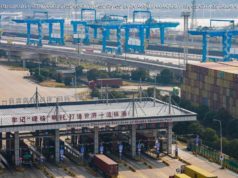Trump wants to limit Chinese investment in the US. China will strike back.
President Donald Trump is on the verge of escalating his trade war with China.
By the end of this week, the Trump administration is expected to release details of plans to restrict Chinese investment in American businesses and block the ability of US businesses to sell some high-tech products to China.
The purpose of the move is to sharply limit China’s access to cutting-edge US technology and thwart the country’s ambition to become the world’s greatest tech hub.
Analysts say the new policies will escalate already sky-high trade tensions between the world’s two biggest economies and are bound to provoke a forceful retaliation from Beijing. It comes after Trump announced on June 15 that his administration will impose tariffs on $50 billion worth of Chinese goods and after threats of tariffs on up to $400 billion more in the future.
Like the tariffs, Trump’s new move will also deal a blow to China’s economy, but it will target something different. It won’t make it harder for China to sell goods in the US and compete with domestic manufacturers. Instead, it strikes at China’s strategy for developing its economy in the future.
At a moment when tensions are running high, “this is a way of communicating to Beijing that the US has a lot of tools at its disposal and it will consider using all of them,” Todd Tucker, a trade scholar at the Roosevelt Institute, a liberal-leaning think tank, told me.
Over the past few months, Trump has begun to execute his promise to crack down on China’s influence on the US economy.
On June 15, the administration said that $34 billion worth of Chinese goods will be subject to tariffs starting July 6, with an additional $16 billion worth of products undergoing further review and public hearings.
Within a day, China promised to retaliate against those tariffs with its own tariffs of “the same strength,” and said it would purposely impose tariffs that will affect American farmers and industrial workers in the Midwest — states that have large populations of Republican voting Trump supporters .
In response, Trump threatened to impose tariffs on up to $400 billion of Chinese exports on June 18.
The recent back-and-forth puts the US and China in the early stages of what could be a sustained trade war, in which both countries continue to strike at each other’s economies with increasingly expansive tariffs.
Trump’s new planned restrictions on Chinese investment and exports to China open up yet another front in the US-Chinese clash.
The anticipated move shows that the Trump administration is trying to deprive China of the kind of technology and products it needs for its “Made in China 2025” program, one of the Chinese government’s biggest initiatives to transform China into an advanced manufacturing powerhouse. It does this mainly by investing in and heavily subsidizing the production of high-tech goods like robotics and energy-saving cars.
The Trump administration’s plan to meddle with this program involves blocking China’s access to key American technology.
Currently, there are some restraints on the way other countries can invest in US businesses. The Committee on Foreign Investment in the United States, known as CFIUS, reviews investments from foreign countries to make sure they don’t pose a national security threat to the US by doing things like appropriating technology that’s vital to the US’s military power.
Tucker, the Roosevelt Institute expert, says the Trump administration is seeking to “expand the concept of national security to include national economic security.” The idea is that the US would set up review processes that don’t just safeguard technology that’s vital for the US to keep its military edge over rivals, but to also ensure the US keeps its economic edge over its rivals.
According to the Wall Street Journal, The Treasury Department is looking into rules that would block firms with at least 25 percent Chinese ownership from investing in US companies with “industrially significant technology.”
This policy is intended to make it more difficult for China to acquire key hardware and software for manufacturing things like robotics, aerospace and aviation equipment, clean energy cars, and medical equipment.
The administration will also roll out rules that will restrict the ability of US companies to ship valuable tech to China for the same reason — to make sure China can’t compete with the US.
“We’ve got trillions of dollars seeking our crown jewels of technology,” White House trade adviser Peter Navarro said last week. “There has to be a defense against that.”
This latest strike at China is unlikely to go unanswered. Recently, Beijing has sounded increasingly impatient as Trump has issued one threat after another to hit China’s economy with tariffs and investment restrictions.
“In the West you have the notion that if somebody hits you on the left cheek, you turn the other cheek,” Chinese President Xi Jinping reportedly told a group of American and European CEOs on Thursday. “In our culture, we punch back.”
China has plenty of ways it can choose to retaliate against the US. It could, for example, choose to meddle in the supply chains of US companies based in China. It could reverse orders to buy major US goods like Boeing airplanes. It could make it harder for US companies to get business licenses to operate in China.
But even without a major Chinese retaliation, Trump’s move on investment and export restrictions will come with a cost to US businesses. US tech exporters of goods like microchips will lose customers; US tech companies will see the pool of potential investors in their enterprises grow smaller.
That prospect caused some panic in the markets on Monday, as investors feared that Trump’s move against China could do substantial damage to the US economy.
Experts say that Trump’s constantly escalating threats of big tariffs against China sometimes appear to be more a function of Trump’s personality than well-thought-out trade policy strategy.
And there are ongoing concerns that the policy roll-outs themselves are messy. On Monday, US Treasury Secretary Steve Mnuchin tweeted that the upcoming restrictions on foreign investment in the US won’t be specific to China, but could also apply to “all countries that are trying to steal our technology.






